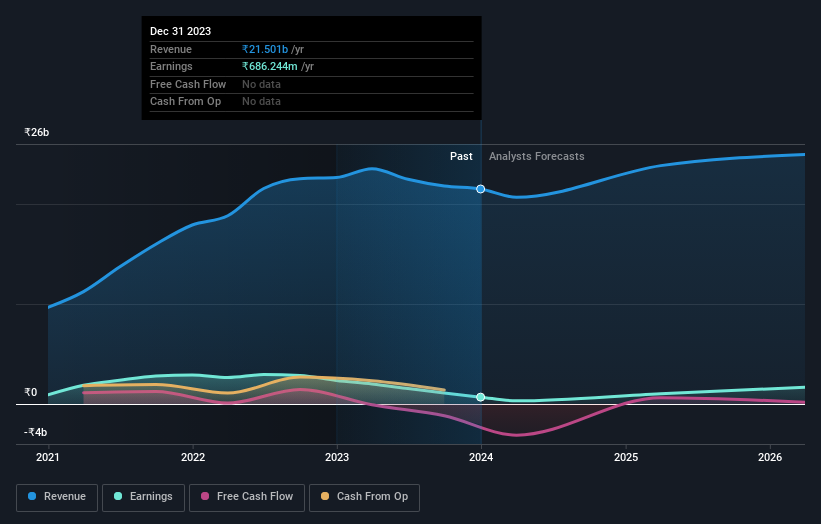Optimism for I G Petrochemicals (NSE:IGPL) has grown this past week, despite five-year decline in earnings

The main point of investing for the long term is to make money. Better yet, you'd like to see the share price move up more than the market average. But I G Petrochemicals Limited (NSE:IGPL) has fallen short of that second goal, with a share price rise of 62% over five years, which is below the market return. Over the last twelve months the stock price has risen a very respectable 8.9%.
Since the stock has added ₹2.2b to its market cap in the past week alone, let's see if underlying performance has been driving long-term returns.
Check out our latest analysis for I G Petrochemicals
While the efficient markets hypothesis continues to be taught by some, it has been proven that markets are over-reactive dynamic systems, and investors are not always rational. One way to examine how market sentiment has changed over time is to look at the interaction between a company's share price and its earnings per share (EPS).
I G Petrochemicals' earnings per share are down 10% per year, despite strong share price performance over five years.
This means it's unlikely the market is judging the company based on earnings growth. Since the change in EPS doesn't seem to correlate with the change in share price, it's worth taking a look at other metrics.
The modest 2.0% dividend yield is unlikely to be propping up the share price. In contrast revenue growth of 20% per year is probably viewed as evidence that I G Petrochemicals is growing, a real positive. It's quite possible that management are prioritizing revenue growth over EPS growth at the moment.
The company's revenue and earnings (over time) are depicted in the image below (click to see the exact numbers).

Balance sheet strength is crucial. It might be well worthwhile taking a look at our free report on how its financial position has changed over time.
What About Dividends?
It is important to consider the total shareholder return, as well as the share price return, for any given stock. The TSR incorporates the value of any spin-offs or discounted capital raisings, along with any dividends, based on the assumption that the dividends are reinvested. Arguably, the TSR gives a more comprehensive picture of the return generated by a stock. We note that for I G Petrochemicals the TSR over the last 5 years was 75%, which is better than the share price return mentioned above. And there's no prize for guessing that the dividend payments largely explain the divergence!
A Different Perspective
I G Petrochemicals provided a TSR of 11% over the last twelve months. But that was short of the market average. On the bright side, the longer term returns (running at about 12% a year, over half a decade) look better. Maybe the share price is just taking a breather while the business executes on its growth strategy. It's always interesting to track share price performance over the longer term. But to understand I G Petrochemicals better, we need to consider many other factors. Take risks, for example - I G Petrochemicals has 2 warning signs we think you should be aware of.
If you are like me, then you will not want to miss this free list of growing companies that insiders are buying.
Please note, the market returns quoted in this article reflect the market weighted average returns of stocks that currently trade on Indian exchanges.
New: AI Stock Screener & Alerts
Our new AI Stock Screener scans the market every day to uncover opportunities.
• Dividend Powerhouses (3%+ Yield)
• Undervalued Small Caps with Insider Buying
• High growth Tech and AI Companies
Or build your own from over 50 metrics.
Have feedback on this article? Concerned about the content? Get in touch with us directly. Alternatively, email editorial-team (at) simplywallst.com.
This article by Simply Wall St is general in nature. We provide commentary based on historical data and analyst forecasts only using an unbiased methodology and our articles are not intended to be financial advice. It does not constitute a recommendation to buy or sell any stock, and does not take account of your objectives, or your financial situation. We aim to bring you long-term focused analysis driven by fundamental data. Note that our analysis may not factor in the latest price-sensitive company announcements or qualitative material. Simply Wall St has no position in any stocks mentioned.
About NSEI:IGPL
I G Petrochemicals
Engages in the manufacture and sale of organic and inorganic chemicals in India and internationally.
Flawless balance sheet, undervalued and pays a dividend.
Market Insights
Community Narratives




